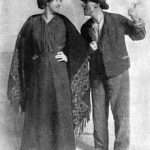Brendan Behan is alleged to have once said that the first item on the agenda of a republican organisation is ‘the split’. Behan’s comment reflected the propensity towards fissure within the ranks of Irish nationalism, but perhaps also reflected the tendency towards division within wider Irish society.
The featured letter in last week’s ‘Irish Farmers’ Journal’ was a polemic against those whom the writer described as ‘yuppies’, city dwellers whom the writer believed had treated agriculture with disdain during the boom years, but now talked about farming as though they knew about the subject.
The writer almost certainly had grounds for a sense of resentment; there are voices in south County Dublin which did, and still do, refer to farmers as ‘culchies’ and ‘rednecks. Such an attitude stands in a long tradition.
In Irish literature rural life is frequently a matter for humour. JM Synge’s ‘Playboy of the Western World’ and Flann O’Brien’s ‘The Poor Mouth’ hardly encourage an attitude of respect for culture beyond the city limits.
If rural life was not a source of humour, it was written of in terms of a grim social realism. John McGahern’s novels depict a materially poor, culturally stifled, claustrophobic society. Brian Friel’s ‘Dancing at Lughnasa’ and ‘Philadelphia, Here I Come’ describe a rural Ireland from which people seek to escape. Even the sympathetic prose of William Trevor conveys a sense of places where the best times are long past.
Rural dwellers, accustomed to generations of being treated with parody or pathos, could hardly be blamed for feeling antagonistic in their attitude towards townspeople, particularly towards Dubliners, but what useful end is served by such antagonisms?
‘You are welcome among the real people of Ireland’, said a man to a broadcaster at a village gathering. What did he mean? That other people were somehow unreal? That those who lived lives very different from that of a farmer were somehow ‘unreal’?
It was a nonsensical comment. Had its lack of logic been pointed out to the man, he would probably have conceded the point, yet it pointed to a polarisation of Irish society, a division between Irish people trapped in similar economic circumstances.
Perhaps the persistence of the urban/rural split, an absurdity in a country of four million people where the population of Dublin is only a million, owes its origins to the lack of proper politics. When the difference between the main parties owes its origin to the side they took in the Civil War, there is a lack of a normal political discourse.
Hurling comments at each other, caricaturing those who live different lives, may have a cathartic effect, but does nothing to address actual issues. Behan would have recognized the continuing tradition of division.
